List of vegetables
Appearance
This is a list of vegetables in the culinary sense, which means it includes some botanical fruits like pumpkins and doesn't include herbs, spices, cereals and most culinary fruits and culinary nuts. Some culinary vegetables (seaweeds like nori) are not even members of the plant kingdom.
A vegetable can be any of the major plant parts - root, stem, leaf, flower, fruit or seed. Vegetables are usually eaten during the main part of a meal while culinary fruits are usually sweet and eaten as desserts, snacks or juices. There are often exceptions, e.g. vegetables can be used in desserts such as sweet potato pie, sweet green tomato pie and sweet eggplant pie. Vegetables are also used in juices.
Western Brassicas

- Broccoli (Brassica oleracea Italica group)
- Brussels sprout (Brassica oleracea Gemmifera group)
- Cabbage (Brassica oleracea Capitata group)
- Cauliflower (Brassica oleracea Botrytis group)
- Kale (Brassica oleracea Acephala group)
- Rapini (Brassica rapa var. ruvo)
Asian Brassicas
- Kai-lan (Brassica rapa var. alboglabra)
- Bok choy (also spelt Bok choi)(Brassica rapa var. chinensis) (Brassica rapa var. pekinensis)
- Komatsuna (Brassica rapa var. perviridis)
- Mizuna greens (Brassica rapa var. nipposinica)
- Oriental mustard (Brassica juncea)
Leafy and salad vegetables

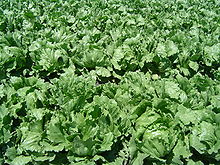
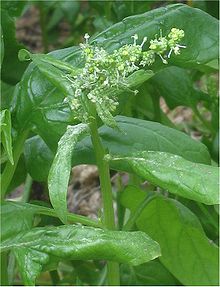
- Amaranth (Amaranthus cruentus)
- Arugula (Eruca sativa)
- Bitterleaf (Vernonia calvoana)
- Catsear (Hypochaeris radicata)
- Celtuce (Lactuca sativa var. asparagina)
- Ceylon spinach (Basella alba)
- Chicory (Cichorium intybus)
- Chinese Mallow (Malva verticillata)
- Chrysanthemum (Chrysanthemum coronarium)
- Corn salad (Valerianella locusta)
- Cress (Lepidium sativum)
- Dandelion (Taraxacum officinale)
- Endive (Cichorium endivia)
- Epazote (Chenopodium ambrosioides)
- Fat hen (Chenopodium album)
- Fiddlehead (Pteridium aquilinum, Athyrium esculentum)
- Fluted pumpkin (Telfairia occidentalis)
- Golden samphire (Inula crithmoides)
- Good King Henry (Chenopodium bonus-henricus)
- Iceplant (Mesembryanthemum crystallinum)
- Kuka (Adansonia spp.)
- Lagos bologi (Talinum fruticosum)
- Land cress (Barbarea verna)
- Lettuce (Lactuca sativa)
- Lizard's tail (Houttuynia cordata)
- Melokhia (Corchorus olitorius, Corchorus capsularis)
- Mustard (Sinapis alba)
- New Zealand Spinach (Tetragonia tetragonioides)
- Orache (Atriplex hortensis)
- Radicchio (Cichorium intybus)
- Samphire (Crithmum maritimum)
- Salad rape (Brassica napus)
- Sea beet (Beta vulgaris subsp. maritima)
- Seakale (Crambe maritima)
- Sierra Leone bologi (Crassocephalum spp.)
- Soko (Celosia argentea)
- Sorrel (Rumex acetosa)
- Spinach (Spinacia oleracea)
- Summer purslane (Portulaca oleracea)
- Swiss chard (Beta vulgaris subsp. cicla var. flavescens)
- Watercress (Nasturtium officinale)
- Water spinach (Ipomoea aquatica)
- Winter purslane (Claytonia perfoliata)
Fruiting and Flowering Vegetables
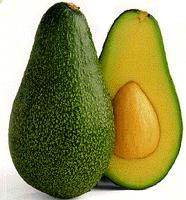

- Armenian cucumber (Cucumis melo Flexuosus group)
- Eggplant or Aubergine (Solanum melongena)
- Avocado (Persea americana)
- Bitter melon (Momordica charantia)
- Caigua (Cyclanthera pedata)
- Cayenne pepper (Capsicum frutescens)
- Chayote (Sechium edule)
- Chile pepper (Capsicum annuum Longum group)
- Cucumber (Cucumis sativus)
- Globe Artichoke (Cynara scolymus)
- Luffa (Luffa acutangula, Luffa aegyptiaca)
- Malabar gourd (Cucurbita ficifolia)
- Marrow (Cucurbita pepo)
- Parwal (Trichosanthes dioica)
- Perennial cucumber (Coccinia grandis)
- Pumpkin (Cucurbita maxima, Cucurbita pepo)
- Snake gourd (Trichosanthes cucumerina)
- Sweetcorn (Zea mays)
- Sweet pepper (Capsicum annuum Grossum group)
- Tinda (Praecitrullus fistulosus)
- Tomato (Lycopersicon esculentum)
- Tomatillo (Physalis ixocarpa, Physalis philadelphica)
- Winter melon (Benincasa hispida)
- West Indian gherkin (Cucumis anguria)
- Zucchini or Courgette (Cucurbita pepo)
Podded Vegetables


- American groundnut (Apios americana)
- Asparagus pea (Psophocarpus tetragonolobus)
- Azuki bean (Vigna angularis)
- Black-eyed pea (Vigna unguiculata subsp. unguiculata)
- Chickpea (Cicer arietinum)
- Drumstick (Moringa oleifera)
- Dolichos bean (Lablab purpureus)
- Fava bean (Vicia faba)
- French bean (Phaseolus vulgaris)
- Guar (Cyamopsis tetragonoloba)
- Horse gram (Macrotyloma uniflorum)
- Indian pea (Lathyrus sativus)
- Lentil (Lens culinaris)
- Lima bean (Phaseolus lunatus)
- Moth bean (Vigna acontifolia)
- Mung bean (Vigna radiata)
- Okra (Abelmoschus esculentus)
- Pea (Pisum sativum)
- Peanut (Arachis hypogaea)
- Pigeon pea (Cajanus cajan)
- Rice bean (Vigna umbellatta)
- Runner bean (Phaseolus coccineus)
- Soybean (Glycine max)
- Tarwi (Lupinus mutabilis)
- Tepary bean (Phaseolus acutifolius)
- Urad bean (Vigna mungo)
- Velvet bean (Mucuna pruriens)
- Yardlong bean (Vigna unguiculata subsp. sesquipedalis)
Bulb and stem vegetables

- Asparagus (Asparagus officinalis)
- Cardoon (Cynara cardunculus)
- Celeriac (Apium graveolens var. rapaceum)
- Celery (Apium graveolens)
- Elephant Garlic (Allium ampeloprasum var. ampeloprasum)
- Florence fennel (Foeniculum vulgare var. dulce)
- Garlic (Allium sativum)
- Kohlrabi (Brassica oleracea Gongylodes group)
- Kurrat (Allium ampeloprasum var. kurrat)
- Leek (Allium porrum)
- Nopal (Opuntia ficus-indica)
- Onion (Allium cepa)
- Prussian asparagus (Ornithogalum pyrenaicum)
- Rhubarb (Rheum x cultorum)
- Shallot (Allium cepa Aggregatum group)
- Welsh onion (Allium fistulosum)
- Wild leek (Allium tricoccum)
Root and tuberous vegetables
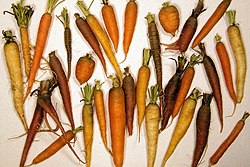
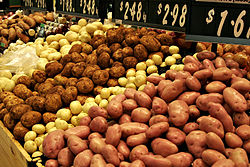
- Ahipa (Pachyrhizus ahipa)
- Arracacha (Arracacia xanthorrhiza))
- Bamboo shoot
- Beetroot (Beta vulgaris subsp. vulgaris)
- Black cumin (Bunium persicum)
- Broadleaf arrowhead (Sagittaria latifolia)
- Canna (Canna spp.)
- Carrot (Daucus carota)
- Cassava (Manihot esculenta)
- Chinese artichoke (Stachys affinis)
- Daikon (Raphanus sativus Longipinnatus group)
- Earthnut pea (Lathyrus tuberosus)
- Ensete (Ensete ventricosum)
- Ginger (Zingiber officinale)
- Gobo (Arctium lappa)
- Hamburg parsley (Petroselinum crispum var. tuberosum)
- Jerusalem artichoke (Helianthus tuberosus)
- Jícama (Pachyrhizus erosus)
- Lotus root (Nelumbo nucifera)
- Maca (Lepidium meyenii)
- Malanga (Xanthosoma sp.)
- Mashua (Tropaeolum tuberosum)
- Mauka (Mirabilis extensa)
- New Zealand rock lily (Arthropodium cirratum)
- Oca (Oxalis tuberosa)
- Parsnip (Pastinaca sativa)
- Pignut (Conopodium majus)
- Plectranthus (Plectranthus spp.)
- Prairie turnip (Psoralea esculenta)
- Radish (Raphanus sativus)
- Rutabaga (Brassica napus Napobrassica group)
- Salsify (Tragopogon porrifolius)
- Scorzonera (Scorzonera hispanica)
- Skirret (Sium sisarum)
- Taro (Colocasia esculenta)
- Ti (Cordyline fruticosa)
- Tigernut (Cyperus esculentus)
- Turnip (Brassica rapa Rapifera group)
- Ulluco (Ullucus tuberosus)
- Wasabi (Wasabia japonica)
- Water chestnut (Eleocharis dulcis)
- Yacón (Smallanthus sonchifolius)
- Yam (Dioscorea spp.)
Seaweed
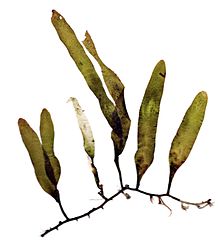
- Aonori (Monostroma spp., Enteromorpha spp.)
- Carola (Callophyllis variegata)
- Dabberlocks (Alaria esculenta)
- Dulse (Palmaria palmata)
- Hijiki (Hizikia fusiformis)
- Kombu (Laminaria japonica)
- Mozuku (Cladosiphon okamuranus)
- Nori (Porphyra spp.)
- Ogonori (Gracilaria spp.)
- Sea grape (Caulerpa spp.)
- Sea lettuce (Ulva lactuca)
- Wakame (Undaria pinnatifida)
